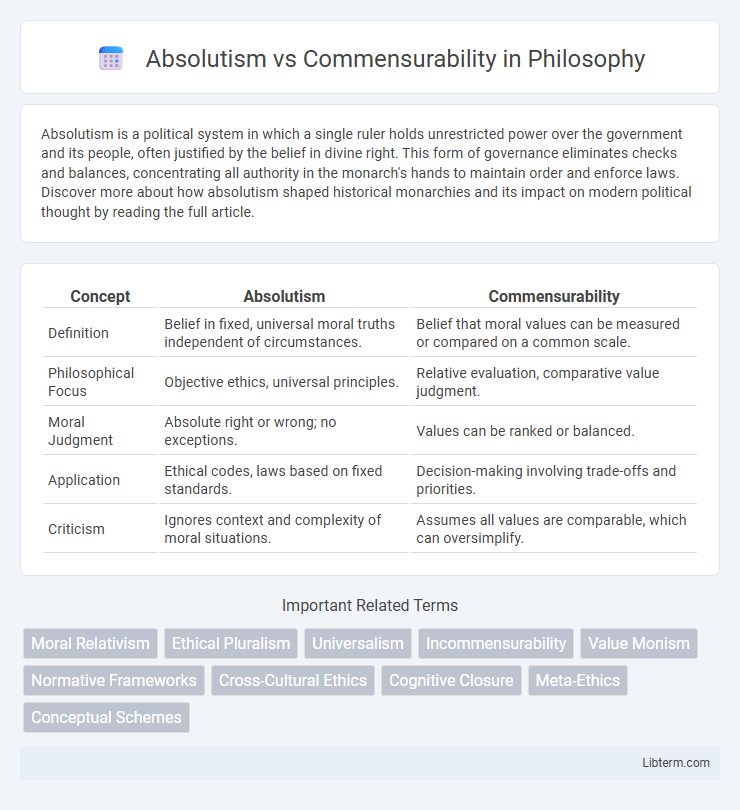Absolutism is a political system in which a single ruler holds unrestricted power over the government and its people, often justified by the belief in divine right. This form of governance eliminates checks and balances, concentrating all authority in the monarch's hands to maintain order and enforce laws. Discover more about how absolutism shaped historical monarchies and its impact on modern political thought by reading the full article.
Table of Comparison
| Concept | Absolutism | Commensurability |
|---|---|---|
| Definition | Belief in fixed, universal moral truths independent of circumstances. | Belief that moral values can be measured or compared on a common scale. |
| Philosophical Focus | Objective ethics, universal principles. | Relative evaluation, comparative value judgment. |
| Moral Judgment | Absolute right or wrong; no exceptions. | Values can be ranked or balanced. |
| Application | Ethical codes, laws based on fixed standards. | Decision-making involving trade-offs and priorities. |
| Criticism | Ignores context and complexity of moral situations. | Assumes all values are comparable, which can oversimplify. |
Defining Absolutism: Core Concepts
Absolutism in ethics asserts that certain moral principles are universally valid and unchanging, irrespective of context or consequences. Core concepts include the belief in objective moral truths, binding duty, and the rejection of relativism or situational variability. This framework contrasts sharply with commensurability, which emphasizes the comparability and trade-offs between different values or ethical considerations.
Understanding Commensurability in Philosophy
Understanding commensurability in philosophy involves assessing whether different values, beliefs, or systems can be measured by a common standard, enabling meaningful comparison and evaluation. This concept contrasts with absolutism, which holds that moral or epistemic truths are fixed and universally applicable, rejecting the idea that diverse perspectives can be directly compared. Philosophers debate commensurability to address conflicts in ethics, science, and cultural norms, examining if differing frameworks can be reconciled or must remain incommensurable.
Historical Contexts of Absolutism and Commensurability
Absolutism, rooted in the political systems of 17th- and 18th-century Europe, emphasized the unchallengeable authority of monarchs, exemplified by rulers like Louis XIV of France who centralized power to maintain state control and suppress dissent. Commensurability, arising in philosophical and economic debates, concerns the ability to measure and compare values or goods with a common metric, pivotal during the Enlightenment as scholars attempted to quantify ethics and utility. The historical context of absolutism shaped rigid governance models, while commensurability influenced emerging ideas about rational decision-making and value assessment in modern Western thought.
Absolutism in Ethics and Morality
Absolutism in ethics asserts that certain moral principles are universally valid, independent of cultural or individual perspectives, establishing fixed standards of right and wrong. This ethical framework emphasizes unchanging moral truths, often grounded in natural law or divine command theory, which dictate absolute duties and prohibitions. Critics argue absolutism can overlook contextual complexities, but proponents maintain its role in providing consistent guidance for moral decision-making across diverse situations.
Commensurability and the Measurement of Values
Commensurability in value theory refers to the idea that different values can be measured and compared on a common scale, enabling consistent evaluation and ranking. This concept challenges absolutism by suggesting that values, although diverse, possess a form of equivalence that allows for rational trade-offs and decisions. Measurement of values under commensurability often involves quantifying ethical, economic, or qualitative aspects to facilitate meaningful comparisons and guide choices systematically.
Key Debates: Conflict and Compatibility
Key debates on Absolutism vs Commensurability center around whether moral principles are universally fixed or can be measured and compared across different contexts. Absolutism asserts that certain ethical standards are immutable and apply to all situations, while commensurability supports the idea that values or principles can be evaluated on a common scale, allowing for trade-offs and prioritization. The conflict lies in Absolutism's refusal to compromise on moral absolutes, whereas compatibility emerges when commensurability is employed to reconcile divergent moral perspectives within a shared evaluative framework.
Major Philosophers and Theoretical Frameworks
Thomas Aquinas and Immanuel Kant significantly shaped the discourse on absolutism by advocating for universal moral laws derived from reason and divine command, respectively. In contrast, philosophers like W.V.O. Quine and Ruth Barcan Marcus championed commensurability, emphasizing the incommensurability of values and the context-dependent nature of ethical judgments within a relativistic theoretical framework. Modern debates in meta-ethics continue to grapple with these competing perspectives, often integrating insights from deontological ethics and pluralistic contextualism to address the complexity of moral decision-making.
Absolutism vs Commensurability in Cultural Contexts
Absolutism in cultural contexts asserts fixed, universal values that govern moral judgments regardless of situational nuances, while commensurability emphasizes the comparability and negotiation of values across diverse cultural frameworks. Absolutist perspectives often resist cultural relativism, promoting unchanging ethical standards, whereas commensurability allows for dialogue that respects cultural specificity and shared understandings. This tension shapes debates on human rights, ethical pluralism, and intercultural communication, highlighting challenges in applying absolute norms across heterogeneous societies.
Implications for Contemporary Thought
Absolutism asserts fixed moral truths, shaping contemporary debates on ethics, law, and human rights by emphasizing universal standards. Commensurability challenges this by promoting the comparability of values across diverse cultural contexts, influencing pluralistic approaches in multicultural societies. These contrasting perspectives impact policy-making, intercultural dialogue, and normative frameworks in globalized environments.
Concluding Insights: Navigating Absolutism and Commensurability
Navigating the tensions between absolutism and commensurability requires recognizing the rigid framework of absolutism, which upholds fixed moral truths, against the flexible nature of commensurability, allowing comparison across differing ethical values. Philosophical discourse benefits from evaluating scenarios where absolute principles clash with context-dependent assessments, highlighting the limits of universal moral judgments. Embracing a balanced approach promotes nuanced ethical reasoning that respects foundational norms while permitting practical adaptability across diverse moral landscapes.
Absolutism Infographic

 libterm.com
libterm.com